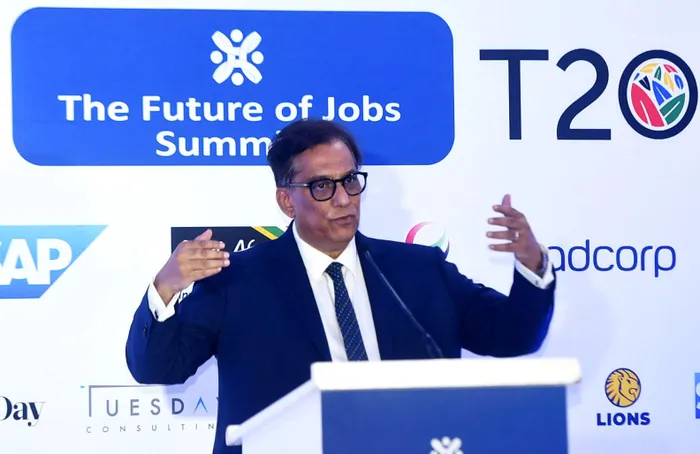
Chairman of Sekunjalo and Independent Media Dr Iqbal Survé, delivers a keynote address during The Future of Jobs Summit, T20 South Africa 2025 at the DP World Wanderers Stadium.
Image: Itumeleng English / Independent Newspapers
Dr Iqbal Survé delivered a compelling blueprint for youth employment at the Future of Jobs Summit, emphasising digital transformation as a pathway out of poverty.
Dr Iqbal Survé, Chairman of Sekunjalo Group, delivered a passionate keynote address at the Future of Jobs Summit 2025, presenting a comprehensive vision for leveraging South Africa’s digital potential to combat youth unemployment. Speaking to government officials and industry leaders, Dr Survé outlined how the content economy and technology sector could become lifelines for millions of unemployed young South Africans.
With youth unemployment reaching a staggering 62.4% for those aged 15-24, Dr Survé painted a bleak picture of the crisis facing the nation. “This isn’t merely a statistic; it represents over 4.8 million young South Africans waking up daily without economic dignity or hope,” he emphasised, drawing from the latest Statistics South Africa report.
However, rather than dwelling on challenges, the business leader presented an optimistic roadmap centred on digital transformation. He highlighted the success story of Thato Joseph Mashifane from Dennilton, Limpopo, who transformed unemployment into entrepreneurship through his viral TikTok character “Sis Maria”.
“Armed with just a smartphone, an old broom, a second-hand laptop, and an unshakeable passion for storytelling, Sis Maria launched a ‘solopreneur’ journey that took him out of unemployment queues,” Dr Survé noted. “If one young South African can transform his future through media and technology, imagine what millions could achieve.”
The Sekunjalo chairman, whose group employs over 8,000 people with 50% being black African youth under 35, demonstrated his commitment goes beyond rhetoric. The company is already nurturing young entrepreneurs at the secondary school level through initiatives like iAccelerate SA, a high school startup accelerator led by Deputy Chair Rayhaan Survé.
Dr Survé’s seven-point strategy focuses heavily on the creator economy, worth $104 billion globally. He proposed establishing “Digital Content Creation Hubs” in townships and rural areas, equipped with professional equipment and training in video production, podcasting, and graphic design.
“We need a ‘Township TikTok Academy’ approach that could empower thousands to earn from global audiences,” he explained, emphasising South Africa’s rich cultural heritage as a competitive advantage in the global digital marketplace.
The technology apprenticeship programmes he outlined align with Microsoft South Africa’s recent R5.4 billion investment commitment, which aims to train 50,000 people in AI, data science, and cybersecurity. Dr Survé sees this as a model for combining infrastructure investment with skills development.
Addressing the gig economy, he noted that South African youth are already participating in global freelance platforms. “Our youth are already teaching English online to students in China and working remotely on global platforms. We see them in McDonald’s and Starbucks, intensely focused on laptops, doing business, and earning an income from anywhere in the world.”
His vision extends to the gaming industry, where he sees untapped potential in South Africa’s cultural narratives. “Our cultural richness—from traditional stories to contemporary urban experiences—offers unique content that global audiences crave,” he said, referencing the $200 billion global gaming market.
Perhaps most significantly, Dr Survé announced Sekunjalo’s $2 billion global AI chip design startup, unveiled at the 2025 World Economic Forum in Davos, positioned to compete with industry giants while creating thousands of youth employment opportunities.
The business leader’s “Digital Ubuntu” philosophy resonated throughout his address: “When one young South African succeeds online, we all succeed.” This collective approach underscores his belief that individual digital success contributes to the nation’s broader digital ecosystem.
As South Africa approaches Youth Month in June, Dr Survé’s message is timely: the private sector must collaborate with the government to create sustainable pathways to take the youth out of poverty. “Our youth don’t need handouts, they need strategic hand-ups into the media and digital economy,” he concluded.
The question, as he posed it, isn’t whether South Africa can afford to invest in youth media and technology opportunities but whether the country can afford not to.
Related Topics:
